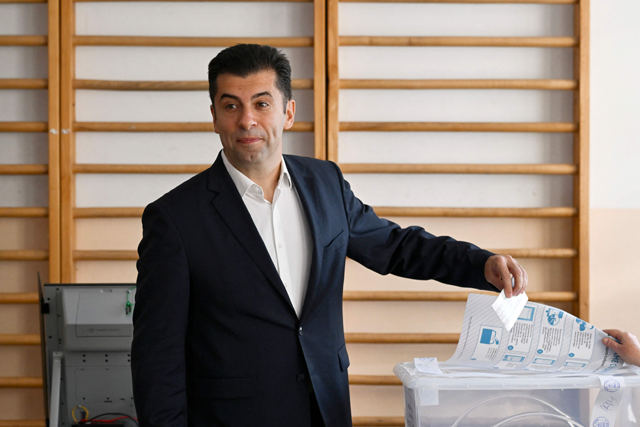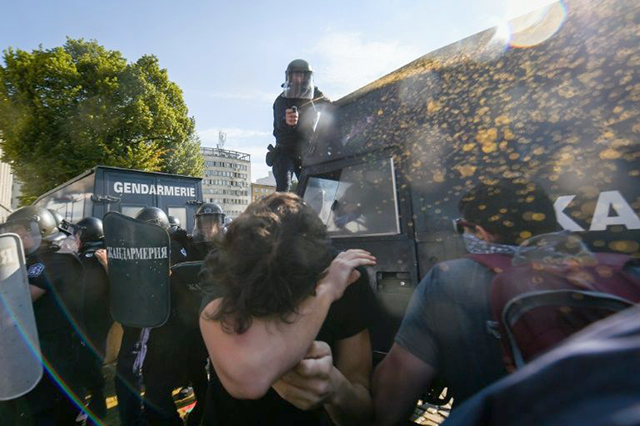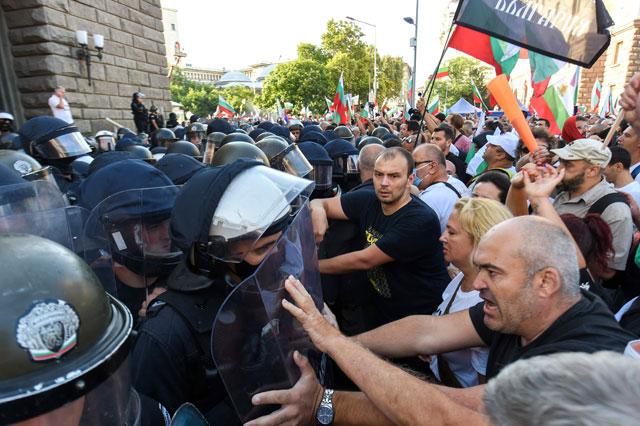You are here
Bulgaria rocked by corruption claims ahead of vote
By AFP - Jul 08,2021 - Last updated at Jul 08,2021

A man walks past posters of the Bulgarian Socialists Party in Sofia on Thursday, ahead of the parliamentary elections (AFP photo)
Sofia — From kidney transplants for rich foreigners at state hospitals to big companies tapping government loans meant for smaller firms, graft in Bulgaria is outraging citizens afresh, a year on from huge anti-corruption protests.
The scores of examples, revealed in daily press conferences by interim Prime Minister Stefan Yanev's administration, have confirmed most of the allegations from those who took to the streets, with ramifications for Sunday's snap parliamentary election.
Yanev was appointed after an inconclusive April 4 general election that saw three-time premier Boyko Borisov come out first but unable to find partners to govern.
Though primarily tasked with organising the new vote, the interim government has also set out to make thorough checks of Borisov's almost 10 years in office.
Yanev says these efforts are a bid to answer protesters' demands for transparency and suspicions about massive graft.
Borisov says they're part of a political witch hunt by his bitter foe, President Rumen Radev, who appointed Yanev's administration. Either way, the accusations are having an impact as public opinion appears to be shifting away from Borisov's GERB Party.
Parallel authority'
"We always knew something was wrong, now we see the full size" of the problem, Yanev said in an interview last week with public BNR radio. He also complained that state agencies allied to the previous administration have been "trying to sabotage" the corruption probes. Like the state-owned development bank that refused to give information about its loans, or the chiefs of the national security and surveillance agencies who took lengthy leave to dodge answering requests. And in the case of the Sofia hospital where wealthy visitors from Israel, Japan and Oman were given kidney transplants from live donors, the head even challenged his sacking in court, Yanev said.
According to political analyst Evgeniy Daynov this is part of a "parallel authority" established and entrenched by Borisov that was now trying to subvert the efforts of Yanev's administration.
'Boiling point'
On top of the scandals within the country, the US Treasury earlier this month blacklisted several prominent Bulgarians, including notorious lawmaker and power broker Delyan Peevski.
He was one of six individuals, along with fugitive gambling tycoon Vasil Bojkov, who were added to the US's sanctions list due to "their extensive roles in corruption".
The move was described by the Treasury as "the single largest action targeting corruption to date" under the Magnitsky Act, a law under which Washington punishes foreign government officials implicated in corruption or human rights abuses.
"This is a sign that corruption in Bulgaria has reached a boiling point... that state capture has reached an extent that can no longer be tolerated," Vessela Cherneva from the European Council on Foreign Relations think-tank told the TV+ television station.
Fourteen years after joining the European Union, Bulgaria remains the bloc's most graft-prone member, according to Transparency International's most recent Corruption Perception Index.
The group's Global Corruption Barometer published last month showed that 48 per cent of Bulgarians polled late last year thought that corruption had increased in the previous 12 months. Fifty-six percent said they believed that their prime minister was involved in corruption, 67 per cent thought the same for MPs and 40 per cent thought that most or all magistrates and judges were corrupt. Election impact
As many as 65 per cent of the 3,000 people polled even said they feared reprisals if they reported graft.
It is uncertain whether the latest revelations will bring any results from the slow and inefficient judiciary, which has often investigated those reporting corruption with more vigour than those accused of it.
While Borisov denies any wrongdoing, the revelations are "weighing heavily on public opinion on the eve of the elections", says Vasil Tonchev, a sociologist at the Sova Harris polling institute. Recent polls have shown Borisov's GERB losing the lead it enjoyed at the last election and now polling almost neck-and-neck with the new anti-establishment populist party There is Such a People (ITN) of showman-turned-politician Slavi Trifonov.
Related Articles
SOFIA — Bulgarians voted Sunday in their seventh election in less than four years, with little hope of an end to political turmoil that has
SOFIA — Bulgaria's ruling party insisted on Thursday Prime Minister Boyko Borisov's government would not resign after two months of protests
SOFIA — Bulgarian police and protesters clashed on Wednesday as parliament met to begin discussion on a new constitution aimed at appeasing
















